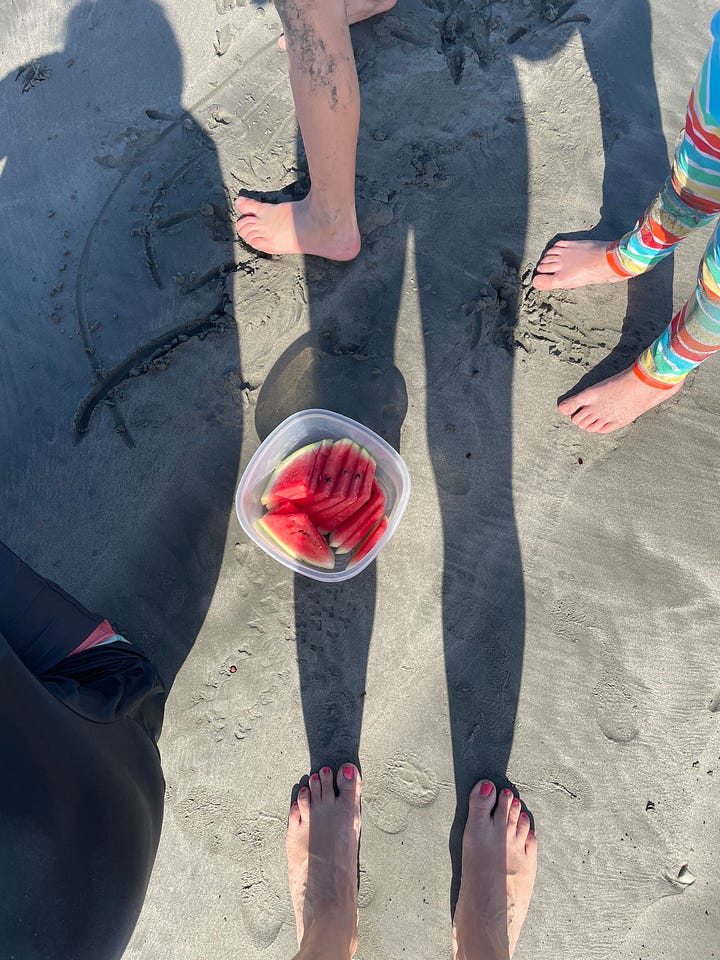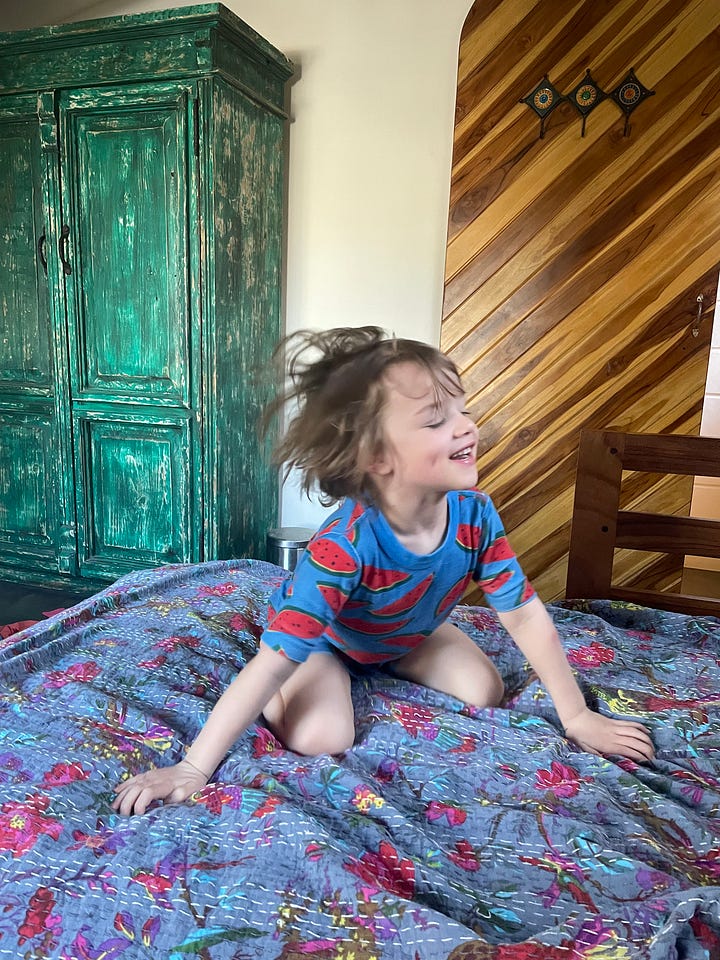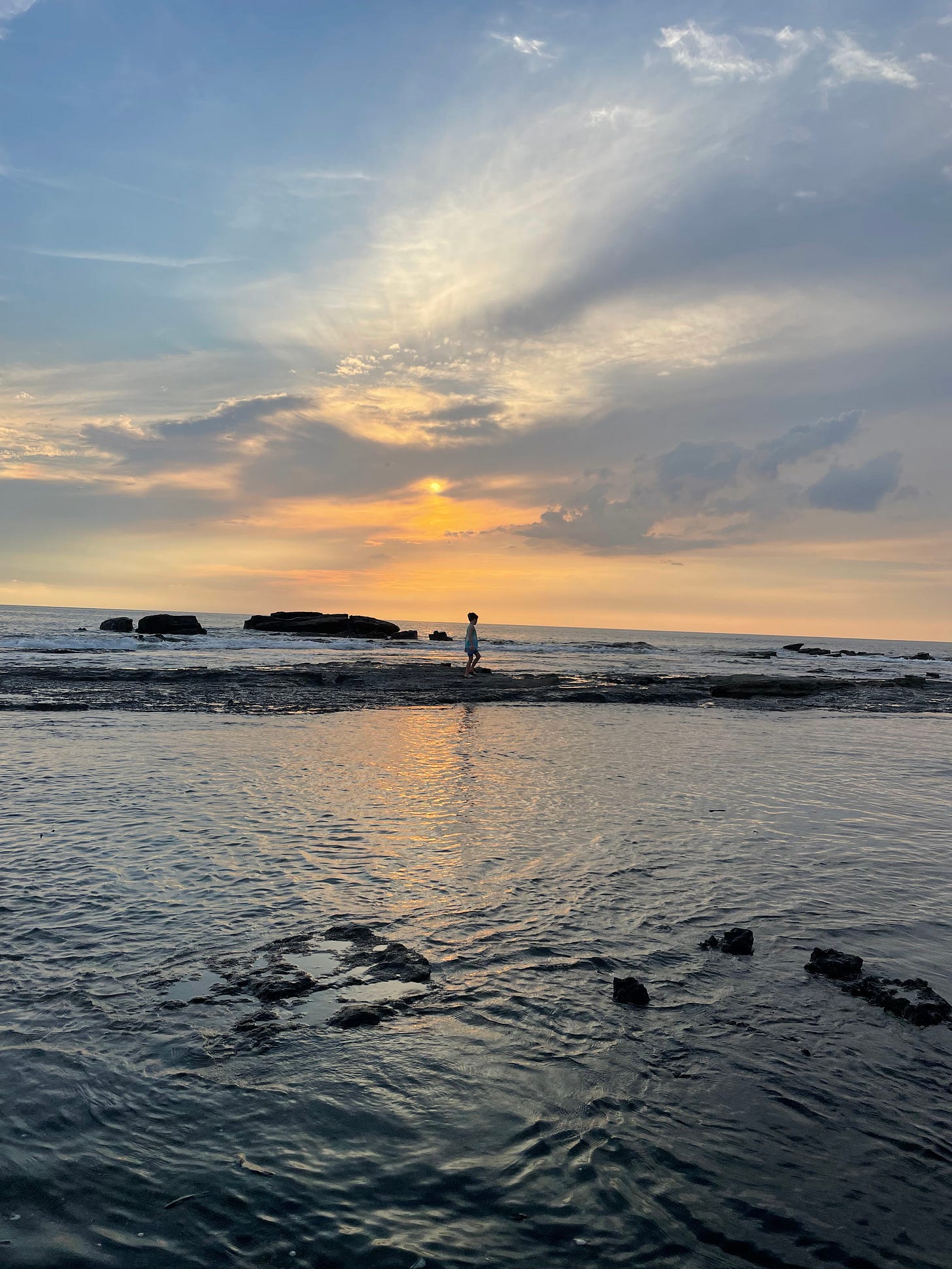One summer, I was a little kid, running free on the beach, and the next, I was a body in a bathing suit. I’ve remained in this state ever since.
This week, whenever possible, my child tapped my belly or jiggled my resting thigh with his little hands. “You’re so juicy,” he said, over and over. “I love it.” The irony is not lost on me. I try to let this message soak in—that the things I don’t like about myself are the things he loves—but my brain is like an old garden bed. The first few inches are soft and permeable, but underneath, everything is so compressed that this lesson pools on the surface of my sense of self.
To watch my Aquarius son in the water is to feel pure, acute joy. He lolls in it. He luxuriates in it. He leaps into it again and again, with his arms spread as wide as he can, as if he could wrap the entire ocean in his embrace.
The first time I fainted, I was on the beach. I was 13. I stood up from my beach towel and blacked out. First, pieces of my vision turned black, sunspots over technicolor. Then came unbearable nausea that I had no choice but to endure, cresting within me like a wave. And then the swift drop into total darkness. The first thing that came back was sound—the concerned voices of people wondering what to do with me. This is also the moment when I wished I didn’t have to come back. That I could slide back into the comfortable darkness for a while longer.
In an undergraduate creative writing class, a fellow classmate told our professor that the sight and feeling of sand made her vomit. He looked at her with delight. “So the beach for you is…” he said.
“A nightmare,” she finished. He grinned.
I felt acute jealousy. I worried, not for the first or last time, that I was too normal to be a writer.By sheer luck I once lived steps from the ocean. Every day, multiple times a day, I could walk down a flight of stairs and step into the cold, clear Pacific. I was homesick and lonely and the water felt like a cure. But at night the sound of the waves on the rock was unceasing, a white noise machine I could never turn off, not even by closing the windows. Now I live far from the ocean, in a nighttime silence so complete that you can hear only the quiet ringing of your own ears.
The Internet feeds me endless videos about “hacks” for braving the beach with kids. Baby powder, to remove sand. A special, soft makeup brush for applying sunscreen. An inflatable kiddie pool, filled with water bailed from the ocean. I used to save them, used to diligently record notes on my phone. I always want to do everything correctly. But now I understand that the actual correct way is to doing nothing special at all. Let them feel the stickiness of the sunscreen and accept it. Let their feet be sandy on the car ride home. They will survive. The idea is to feel the difficult parts—the discomfort and inconvenience—and love it all the same.
My little one is learning to love the beach, slowly. This week, for the first time, I coaxed him onto a boogie board and tugged him along behind me in sand coated with the barest slick of water. “Faster, mama,” he cried, this child who would usually rather not go too fast, too high, too far. I walked faster. I could feel the people on the beach watching me. “Faster, mama!” he cried again, and I started to jog. The faster I ran, the louder he laughed—the effervescent, uncontrolled laughter of someone who is experiencing something truly exhilarating for the first time. I ran faster still. The sand gave way underfoot in just the way I remembered. My legs pumped in just the way they used to. The hardened soil of my psyche loosened. I let myself run as fast as I could. I let the rest go.








Tender and thoughtful and brilliant, especially the brain like an old garden bed analogy. Also I love the idea that you think you’re “too normal” 😂
I love the "love it all the same." Yes, let them be okay and accepting of a little stickiness, a little discomfort, a little sand. Let them be in the world and adjust their sails to whatever winds blow. A beautiful piece of writing. Thank you, Holly!